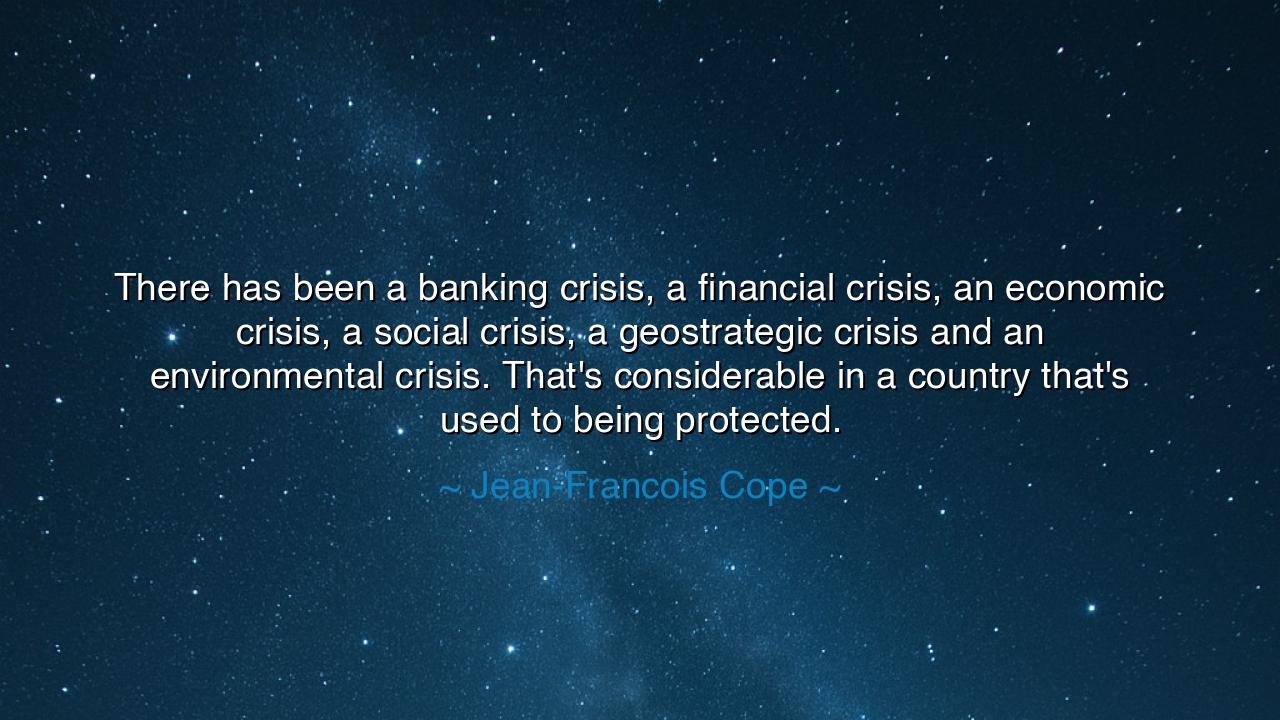
There has been a banking crisis, a financial crisis, an economic
There has been a banking crisis, a financial crisis, an economic crisis, a social crisis, a geostrategic crisis and an environmental crisis. That's considerable in a country that's used to being protected.






The words of Jean-François Copé, “There has been a banking crisis, a financial crisis, an economic crisis, a social crisis, a geostrategic crisis and an environmental crisis. That's considerable in a country that's used to being protected,” strike like a thunderclap across the sky of complacency. They reveal the shattering truth that even the strongest of nations, even those wrapped in comfort and long accustomed to safety, are not beyond the reach of calamity. To name each crisis one by one—banking, financial, economic, social, geostrategic, environmental—is to toll the bells of warning, each a different voice of distress, yet together forming a chorus that shakes the foundations of a people’s confidence.
The origin of this declaration lies in the turmoil of modern France, spoken at a time when shocks rippled through the pillars of stability. It was a reminder that the fortress of prosperity is never invincible, that to be “protected” is often an illusion, a temporary veil covering the fragility beneath. Copé, a statesman, voiced what others hesitated to say: that the age of certainty had passed, and the storms of the world had torn through walls once thought secure. His words are not mere lament but a summons to awaken, to cast aside illusions of invulnerability, and to meet reality with courage.
History has shown us again and again that nations fall not because of one blow, but from the weight of many crises arriving at once. Consider the fall of the Roman Empire. It was not a single barbarian army, nor a single famine, nor a single betrayal that brought Rome to its knees. It was the convergence—economic decay, military overstretch, political corruption, and environmental strain. Rome, too, thought itself protected by its legions and its grandeur, but the tide of crises revealed its mortality. Copé’s words echo this ancient truth: no society, however great, is beyond collapse when arrogance blinds it to the storms gathering on the horizon.
Yet these words also awaken the spirit to resilience. For what is a crisis, if not a fire that tests the strength of stone? A banking crisis may shake gold, but it cannot destroy character. A social crisis may unsettle cities, but it can awaken solidarity. An environmental crisis may scar the land, but it can summon the people to revere the earth anew. Though the list of calamities is long, the spirit of humanity has always been longer, stretching across time to endure, adapt, and rise again.
Still, we must not fall into the comfort of waiting for endurance alone. The lesson here is vigilance. Nations that are “used to being protected” risk the great sin of complacency. They trust too deeply in walls, institutions, and wealth, forgetting that vigilance and unity are the true shields of a people. The wise citizen is not the one who says, “It cannot happen here,” but the one who prepares, who builds strong communities, who demands justice in finance, fairness in society, stewardship in the environment, and foresight in leadership.
Consider the story of Japan after World War II. Crises had shattered the nation—economic ruin, social upheaval, geostrategic humiliation, environmental devastation. Yet from ashes arose resilience, discipline, and innovation. The people did not cling to the illusion of protection; they built strength anew. They invested in education, rebuilt industries, and forged unity. What was once a nation of ruin became a nation of renewal. This is the example that Copé’s warning calls us to remember: that crisis, though destructive, can be the womb of rebirth if faced with wisdom and action.
The clear lesson, then, is this: do not depend on the illusion of protection. Expect crises as the sea expects storms. Build your house not upon sand but upon rock—upon virtues of discipline, foresight, and solidarity. In your personal life, prepare not with fear but with wisdom: save in times of plenty, cultivate resilience in times of calm, strengthen the bonds of community before disaster strikes. And in the life of nations, demand leaders who see beyond the present moment, who acknowledge weakness openly, and who call forth the courage of the people.
So let Copé’s words be etched in memory. “There has been a banking crisis… a social crisis… an environmental crisis.” Each crisis is a teacher, each a summons to maturity. The nation that forgets its vulnerability is already half-defeated, but the nation that awakens to its fragility can rise stronger, wiser, and truer. Let us then walk not in fear, but in readiness, knowing that protection lies not in walls of stone or gold, but in the unyielding spirit of a people who stand together in the face of storms.






AAdministratorAdministrator
Welcome, honored guests. Please leave a comment, we will respond soon